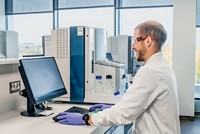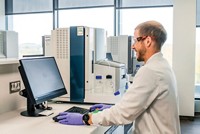Advertisement
Grab your lab coat. Let's get started
Welcome!
Welcome!
Create an account below to get 6 C&EN articles per month, receive newsletters and more - all free.
It seems this is your first time logging in online. Please enter the following information to continue.
As an ACS member you automatically get access to this site. All we need is few more details to create your reading experience.
Not you? Sign in with a different account.
Not you? Sign in with a different account.
ERROR 1
ERROR 1
ERROR 2
ERROR 2
ERROR 2
ERROR 2
ERROR 2
Password and Confirm password must match.
If you have an ACS member number, please enter it here so we can link this account to your membership. (optional)
ERROR 2
ACS values your privacy. By submitting your information, you are gaining access to C&EN and subscribing to our weekly newsletter. We use the information you provide to make your reading experience better, and we will never sell your data to third party members.
Informatics
Exscientia signs AI-powered drug-discovery deal with Celgene
The Scottish start-up views its latest pharma partnership as validation of its algorithms—and as a stepping stone towards becoming a drug company itself
by Ryan Cross
March 21, 2019

The artificial intelligence (AI)-based drug-discovery company Exscientia is off to a busy start this year. In January, the Scottish start-up announced a partnership with Roche that yielded about $68 million in upfront payments. Exscientia raised $26 million in series B financing that same month. And today it’s announcing a deal with Celgene to develop three small-molecule drugs for cancer and autoimmune diseases.
The new deal earns Exscientia an immediate $25 million, but CEO Andrew Hopkins suggests that it’s the undisclosed milestone payments his start-up could receive that make this pact special. “We believe this is the largest deal done so far in the sector of AI drug discovery,” Hopkins says.
Although it’s impossible to evaluate that claim, it’s clear that AI is one of the hottest, and most contentious, topics in the drug industry right now. As AI-focused drug start-ups pop up left and right, executives and chief scientists at big pharma firms are trying to parse hype from reality. Does AI offer something new, or is it just fancy wrapping on the computational modeling and data-science techniques that drug companies have used for years?
An answer won’t come anytime soon, but many drug firms are nonetheless anteing up. Exscientia has now struck collaborations with seven drug companies—including Evotec, GlaxoSmithKline, Roche, and Sanofi—that it estimates are worth more than $1 billion in potential milestone payments and royalties. Many of these deals include up-front payments too, making Exscientia stand out as a start-up that’s actually generating revenue.
Exscientia uses a design-build-test model to guide its drug-discovery programs. “The entire decision-making and design process is driven by algorithms,” Hopkins says. The start-up’s algorithms are fed data that they use to design several small molecules for a specific protein target. A computer prioritizes which compounds to test and, if a human chemist agrees, the compounds are synthesized and tested as drugs. The results of those tests are fed back into the algorithms to suggest additional, hopefully better, compounds.
In the past, Hopkins says, Exscientia focused on the design step—which is generally where AI comes into play—while the drug-company partners did the synthesizing and testing. In the new Celgene deal, Exscientia is taking full responsibility for all steps of the process. “This is an important evolution in our business model,” he says.
Hopkins wants Exscientia to become a fully-integrated biotech company—one that identifies targets, designs drugs, and tests them in the clinic. “We like to use the term full stack,” he says, borrowing lingo from the software industry. The start-up’s recent series B funding will take it a step in that direction by fueling in-house drug-discovery programs.
To execute its full-stack vision, Exscientia is looking toward other successful start-ups, such as Moderna, as role models. “We’ve been inspired by how platform companies such as Moderna really thought about how to build up a large pipeline,” Hopkins says.
Advertisement
Moderna spent years developing a way to make messenger RNA-based therapies, racking up several partnerships and some $2.6 billion in private funding on its way towards becoming a major player in the biotech industry. Today, it has 21 drug-programs in its pipeline and a stock-market value of almost $7 billion. Hopkins is thinking about how Exscientia can make “an equivalent play in the AI space.”
That might require Exscientia to expand how it uses AI. Most AI drug start-ups are focused on automating and optimizing a particular step in the drug discovery and development process. At the moment, Exscientia has honed its computers to do the drug-design step, leaving the synthesizing and testing of compounds to chemists.
But Hopkins notes that automating—at least partially—all steps in the design-build-test model, is on his mind as well. “The faster we can generate data, the faster we can bring it back to the algorithms, and the faster a project can progress,” he says. “That’s an important aspect in our thinking as we really start to plan out how to scale the company.”





Join the conversation
Contact the reporter
Submit a Letter to the Editor for publication
Engage with us on Twitter